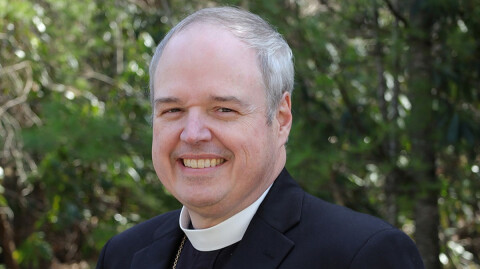TLDR: The Prayer of Manasseh combines well-known facts from the Old Testament and elements of the Apocrypha. The prayer affirms that even the worst of offenders can find mercy and forgiveness with God. Please read below to learn more about this prayer, which we find as Canticle 14 in our BCP.
I started the First Sunday of Lent liturgy, processing in from the Narthex, reciting a fairly unknown prayer, which has a very interesting history. The prayer reads as follows:
“O Lord and Ruler of the hosts of heaven, God of Abraham, Isaac, and Jacob, and of all their righteous offspring: You made the heavens and the earth, with all their vast array. All things quake with fear at your presence; they tremble because of your power. But your merciful promise is beyond all measure; it surpasses all that our minds can fathom. O Lord, you are full of compassion, long-suffering, and abounding in mercy. You hold back your hand; you do not punish as we deserve. In your great goodness, Lord, you have promised forgiveness to sinners, that they may repent of their sin and be saved. And now, O Lord, I bend the knee of my heart, and make my appeal, sure of your gracious goodness. I have sinned, O Lord, I have sinned, and I know my wickedness only too well. Therefore I make this prayer to you: Forgive me, Lord, forgive me. Do not let me perish in my sin, nor condemn me to the depths of the earth. For you, O Lord, are the God of those who repent, and in me you will show forth your goodness. Unworthy as I am, you will save me, in accordance with your great mercy, and I will praise you without ceasing all the days of my life. For all the powers of heaven sing your praises, and yours is the glory to ages of ages.” Amen.
This beautiful piece of literature, known as The Prayer of Manasseh, combines well-known facts from the Old Testament, and elements of Inter-Testamental writing motifs, traditionally called The Apocrypha. The prayer was never seen as canonical or as a part of the Christian Bible, but it was held in great esteem by the Orthodox Church and the Church fathers. Unfortunately, most of the Roman Catholic breviaries of the Middle Ages do not include this prayer or relegate it to an appendix at the back of the book. The various Books of Common Prayer (1549, 1552, 1662, 1928) do not include this prayer at all, and it no longer appears in most Catholic translations of the Bible. In many ways, the Episcopal Church has greatly contributed to the preservation of this amazing prayer, by including it as Canticle 14 in the Morning Prayer service of the 1979 Book of Common Prayer. (Hatchett, Commentary on the American Prayer Book, 120.) Now, let us briefly review the background of the prayer.
The historical record of King Manasseh (687-642 B.C.E.) is derived primarily from two sources: 2 Kings 21:2-9 and 2 Chronicles 33:10-20. According to 2 Kings, Manasseh was a wicked sovereign who “was evil in the sight of the Lord... He erected altars for Baal, made a sacred pole... Worshipped all the host of heaven... Built altars for all the host of heaven in the two courts of the house of the Lord. He made his son pass through fire; he practiced soothsaying and augury, and dealt with mediums and with wizards...” In short, Manasseh was uniquely wicked, enthusiastically promoted the cult of pagan gods, believed in child sacrifice, and disregarded the commandments of God with great abandon.
According to 2 Chronicles 33:10-20, Manasseh’s refusal to obey God’s commands caused his exile, when the Babylonian army, “Took Manasseh captive in manacles, bound him with fetters, and brought him to Babylon.” In Babylon, Manasseh realized his sin against God and “He entreated the favor of the Lord his God and humbled himself greatly before the God of his ancestors. He prayed to him, and God received his entreaty, heard his plea, and restored him again to Jerusalem and to his kingdom.” Unfortunately, 2 Chronicles does not give us the actual prayer the king invoked to repent of his sins. According to David deSilva, the omission of this prayer created an “Open invitation for any pious Jew to fill the gap in the tradition.” (deSilva, “Introducing the Apocrypha, 296-300.) The gap was filled anywhere between the year 200 and the year 50 before Christ, when the Prayer of Manasseh was composed.
I particularly like the penitential themes of this prayer, especially during the season of Lent. The prayer, “Teaches the infinite compassion of the Almighty and the efficacy of true repentance... It proclaims that even the worst of offenders can find mercy and forgiveness with God.” (Ibid, 300). During this season of Lent, I invite you with the author of the prayer to “Bend the knees of your heart” and repent of your sin, knowing in advance that God if full of compassion and abounding in mercy.
Let us pray,
“Lord, forgive us. Do not let us perish in our sin, nor condemn us to the depths of the earth. For you, O Lord, are the God of those who repent, and in us you will show forth your goodness.”
In Jesus name we pray, Amen!





